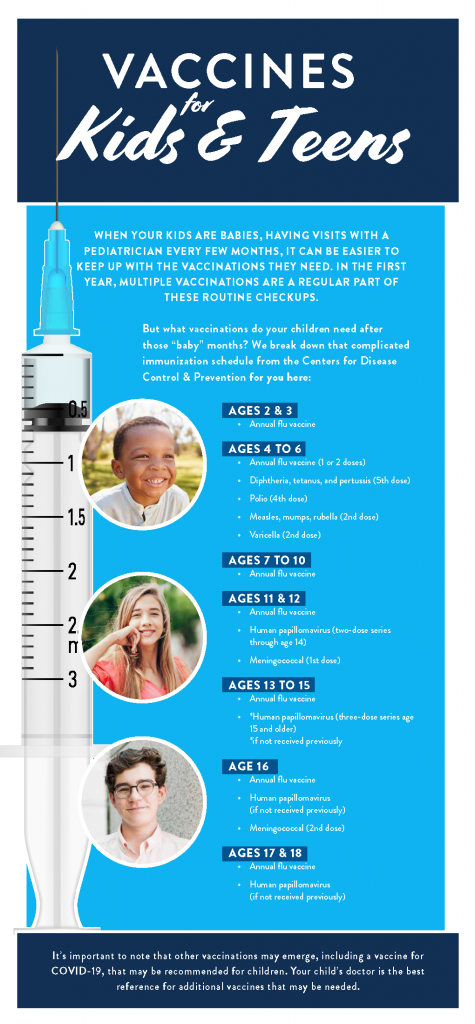A Shot of Good Health: Vaccines & Kids
For most parents, having to take their kids to the doctor for a shot isn’t their favorite part of being a parent. But in reality, it’s probably one of the most important parts of parenthood.
Those shots, which deliver vaccines, are truly lifesaving. They represent innovations in the last couple centuries that allow us to protect ourselves and future generations from illnesses that previously led to disability and even death.
Over the years, health experts have put together a recommended strategy— known as the recommended immunization schedule—for helping children avoid these now-preventable diseases.
You may still be wondering why vaccines are so important, and why your child needs them at specific ages.
Why Vaccines Are Important
When babies are born, they have antibodies that protect them from many diseases. Those antibodies are passed from mother to child and provide some protective immunity.
But after a period of months, that immunity disappears, leaving babies at risk of dangerous illnesses.
In order to provide babies with that same level of protection after those initial antibodies disappear, their immune systems need to be stimulated in another way. That’s where vaccines come into play.
Most vaccines work in a similar way. A small amount of an inactivated or weakened germ is injected into the body. The body detects that germ, and the immune system kicks into overdrive to produce antibodies that provide protection against the illness.
For most vaccines, that protection is typically long-lasting, continuing for years or even for life. Others, like the flu shot, are needed more frequently because they are reformulated to protect against new strains of the virus.
It’s important to note that vaccination is entirely safe. While mild side effects like a fever or pain at the injection site may occur with some vaccines, vaccines are recognized as a safe way to boost the immune system and protect overall health.
In the past, the only way for the immune system to develop antibodies against a disease was to actually get sick with the disease, which could sometimes be deadly.
While we often think of vaccines as something for children, it’s important to note that adults should be vaccinated at different times throughout life. An annual flu shot is recommended for nearly everyone age 6 months and older, and other vaccines are recommended for specific age groups.
What About a COVID-19 Vaccine?
The COVID-19 vaccine[1] is currently in the news, so you may be wondering if it’s right for your children. Right now, there isn’t enough information from research studies to determine the vaccines’ efficacy in children. The Pfizer vaccine is approved for people age 16 and older and the Moderna vaccine is recommended for people age 18 and older.
That’s expected to change as we move forward and more studies are conducted, so check in with your doctor about when a COVID-19 vaccine may be available for children.





